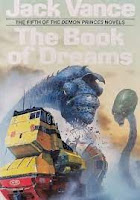In the fight to remain ashore as the waves of history wash things away, Theodore Sturgeon is clinging to the sands by a finger or two. Approaching fantastika more from a literary perspective than genre, such is fate for the concern of human nature. In an attempt to let Sturgeon keep his grip a bit longer, let's look at one the writer's best works, A Touch of Strange (1958).
For a writer who wrote predominantly short fiction, A Touch of Strange is a key point in Sturgeon's ouevre. Though containing only seven stories, it showcases the author in or at peak form. “Mr Costello, Hero” opens things on a quiet note, however. It is the story of a spaceship’s purser and his relationship with a fellow crewmen, the titular Mr. Costello. Arriving at their destination planet, the purser runs into a strange cult who believe everything—everything—must be communal. Such an economic philosophy not to the purser’s taste, he nevertheless finds himself the subject of Mr. Costello’s silver tongue. Not the greatest story contrasting freedom of choice with social obligation, but a solid stab.










